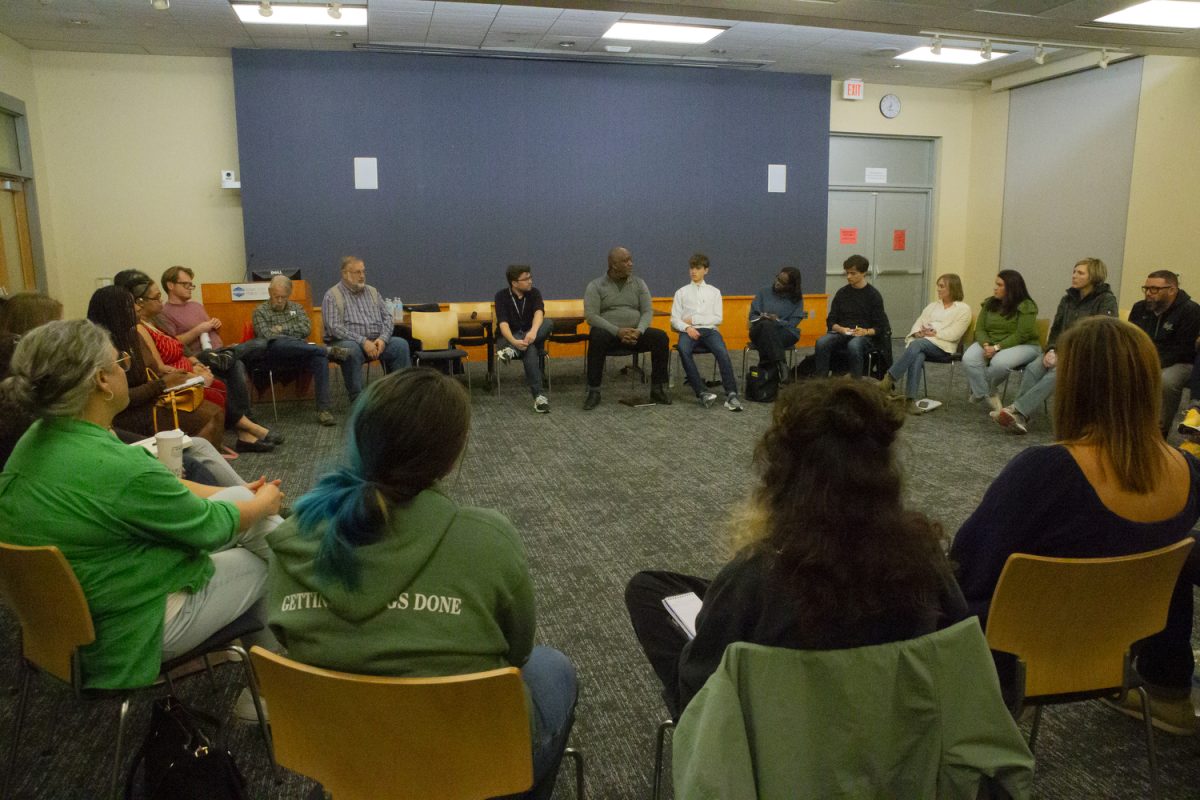Members of Iowa City’s community gathered Monday night for a discussion on how the public school systems in place enable students, particularly students of color, to end up in the prison system.
The discussion was hosted by the Iowa City’s Office of Equity and Human Rights and coordinated with the Iowa City Public Library and the African American Museum of Iowa.
In attendance were 30 participants and several prominent members of the Iowa City community, including Iowa City City Council candidate Mandi Remington and Iowa City Community School District school board candidate Mitch Lingo.
The conversation took form after the ICPL put up an original display from the African American Museum of Iowa, which documents the role public schools can play in pushing kids into the prison system. The display is called “Suspended: Systemic Oppression in Our Schools,” and will be on display in the ICPL until Nov. 30.
Adult Services Coordinator at the Iowa City Public Library Jason Paulios said the idea of the discussion was for people to see the exhibit and then be able to have a conversation about it.
“That’s sort of what we do is just provide a space for the community to learn and to share,” Paulios said.
Sam Black, former school resource officer for Cedar Rapids public schools, served as the discussion leader. Black works to ensure that the system serves the people it intends to serve, and he believes there are still issues in the public education system.
Black opened up the conversation to ask the community if they thought there was a pipeline that led students into the prison system.
Remington said there are higher rates of seclusion, restraint, suspension, and expulsion for Black students in the U.S. compared to white students starting in elementary school.
Data from the United States Government Accountability Office confirms this reflecting that Black students in the U.S. account for only 15.5 percent of public school students, but represent 39 percent of students suspended from school. This data shows an overrepresentation of Black students by 23 percentage points.
Remington also claimed that Iowa has a high discrepancy in marijuana arrests based on race even though usage between races is the same. Remington talked about how there are force discrepancies in policing, noting she works on the Police Review Board.
A study from the ACLU found that a Black person in Iowa is 7.3 times more likely to be arrested than a white person for marijuana possession, noting that both groups use marijuana at about the same rate.
“That just kind of shows you that it’s something that starts in elementary school and continues to adulthood,” Remington said.
Black noted the social dynamics of how people often only interact with other races in a service setting, but rarely in situations outside of work or school. Black said this can lead to ignorance of other cultures and a lack of knowledge on how to properly address behavioral issues.
The group also discussed how there are parallels between zero-tolerance policies and designating students as “high risk” is a system that correlates with prison environments.
What can become an issue, Black claims, is students will get more severe punishment for an action if they are deemed high-risk than a student who may have committed the same act, but not is not seen as high-risk.
The issue then becomes that the high-risk student receives more punishment making it harder for them to succeed, Black said.
“There’s the notion that once a child has been a behavioral challenge, they’re always a behavioral challenge, and so then we need to respond as if the child has been a historical behavioral challenge as opposed to a child who has an incidental infraction,” Black said. “So then we’ve got another parallel here with the criminal justice system.”
RELATED: Nigerian scholar brings unique perspective to UI Homebuilding in the Heartland project
With these challenges, Black said the solutions will come from conversations like the one at the library to talk about acceptable behaviors in school and how equity can be given to students to allow everyone to succeed. Most importantly, it comes from the community, Black said.
After the discussion, Lingo spoke with The Daily Iowan about what he found important from the conversation.
Lingo said he was interested in the subject because of the correlation between people coming from school and going to jail.
“When I see some of my former students who are now in jail, it scares me, and I believe this is a topic that needs continued conversations,” Lingo said.



